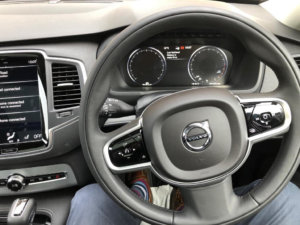“Mind The Gap!” – The life and times of a man on the move Episode 23
Who’s driving? Not me! Look ‘right’ on London’s roads! Don’t get Brexit wrong, a cheap way to visit your customers and some lightning avoidance in Limassol

In this weekly series, I look back on what stood out, what was bemusing, amusing and interesting during my weekly travels, interesting findings within the FX industry and interaction with an ever-shrinking big wide world. This is purely observational and for your enjoyment.
Monday: An AI-solating experience
Artificial intelligence (AI), and I mean real self-learning intelligence which eventually develops specific skillsets which can be perfected automatically by a combination of computer software and hardware rather than human neurological and cognitive interaction, has become a major focus of investment, research and development for many firms in the financial sector recently, particularly at Tier 1 bank level.
In Japan, where the last 9 years have been spent by active self-directed retail traders who manually trade the FX market via domestic-market giants resulting in a continual dominance at 35 to 40% of all retail FX order flow globally, the retail brokerage sector is trialling fully automated self-learning technology, the most recent example being the AI Chatbot being tested by GMO’s FX Prime, a division of the vast Japanese retail brokerage that regularly conducts over $1 trillion per month in notional volume.

Just a month ago, Fujitsu announced the establishment of a new company that will formulate and carry out strategy for its AI business in Vancouver, British Columbia, representing a modern-day progression by Fujitsu toward full provision of artificially intelligent solutions which I expect will form part of the Tier 1 dealing and trading structure of global banks, largely because Fujitsu has always had a strong outsourced technology and systems architecture division providing service to the financial sector.
Back in 2003, I led a hardware migration project at Merrill Lynch under a consultancy firm that I ran for 18 years, this particular project being part of an infrastructure outsourcing contract with Fujitsu-Siemens, the project beginning just a few years after Fujitsu founded a 50/50 joint venture between Fujitsu Limited of Japan and Siemens of Germany and began competing with Steria, Accenture, Capita IT and Atos for systems architecture contracts at major banks.
The task was to remove all local machine hardware and deployable applications and replace them with virtual machines by implementing the then-new VMWare technology. This not only increased security as personnel would have no local hard drive, but also increase logistical efficiency as office spaces could become completely flexible due to absolutely no locally held server farms or networks of client desktops.
Deployable applications had been a mainstay for roaming profiles in secure environments such as banks for many years, usually held server-side and deployed and returned via MSI packages, however as soon as VMWare began to gain ground, MSI Packaging died a very sudden death, thankfully! Anyone who, like me, has spent many a day in the late 1990s in solitary confinement with Orca trying to iron out conflicts in 1000 applications and each time a new conflict is dealt with, it creates another!
There is no more Norton Ghost or workstation-based network performance testing environment these days!
The overall efficiency of this development Back in 2003, Merrill Lynch lauded their new project by stating “VMware virtual machine software for Windows enables us to solve a variety of challenging IT issues in a quick, cost-effective manner,” said John McKinley, chief technology officer at Merrill Lynch. “By embracing virtualization technology and standardizing on VMware for managing our software development environments, Merrill Lynch has seen a 40 – 50% cost savings.”
That was over 15 years ago, however. Today, the banks are not only automating and reducing hardware dependency but are going intelligent, however so is everything else and whilst the execution today is far more advanced, the objective is the same – to reduce costs, minimize mistakes and human error, and speed things up.
On Monday last week, I drove from the West Country, the part of England where hats are made of straw, to London, the part of England where hats are made in Jermyn Street.
Well, when I say I drove, that is stretching things just a little bit because I may well have been sitting in the driver’s seat and been responsibly ‘in charge’ of the vehicle, but a supervisory role is really all I took, because to all intents and purposes, the car drove itself.

Self-driving technology has polarized opinion from lawmakers to car manufacturers, however I can clearly vouch that this technology is well and truly here, and is quite simply better than the standard ham-fisted regular driver such as me.
During this 285 mile round trip, the car in question – a 2018 Volvo XC90 T5 – drove itself, stopped, started, steered and navigated traffic absolutely perfectly, using 8 cameras, a satellite signal, radar guidance and proximity sensors, and did so in a smoother, safer and more efficient way than I could, and I am although obviously not the best driver that has ever graced the earth, a car enthusiast.
I arrived wide awake, with absolutely no fatigue, and relaxed as the system is so advanced that it ‘learns’ things like weather conditions, driving preferences and the ebb and flow of traffic on certain routes. It even works out what level of rain or humidity is likely to be in the area to operate the wipers and heated screens accordingly.
I really believe that as this technology filters its way into every vehicle, there will be less accidents, and less tiredness. Yes, you have to legally be ‘in control’ of the vehicle and every so often Volvo’s system asks you to touch the steering wheel to ensure you are paying attention and if you don’t it pulls over and stops the car, and if you take your eyes off the road, a warning is displayed on the screen to alert you to pay attention but this is legal and safety stuff – I really do see a fully autonomous future of mobility.
Imagine this self-learning technology in trading desks. AI could learn the preferences for order flow and business model of the company it is installed in and after a few days of manual dealer transactions, it could theoretically ‘drive’ itself, thus giving a cost effective model for brokers and banks, less error, 24 hour coverage without tiring shift patterns, and a consistent outcome for customers and liquidity takers.
I’m all for it. Now where did I put my pension book?……
Tuesday: The diesel dinosaur
Thankfully, disruptive activities by traditional business sectors that rely on legacy dynamics are becoming less and less effective, as demonstrated by the extremely quiet and calm manner in which thousands of people got their day’s work done last Tuesday without even a modicum of interruption despite the militant activities of the monopolistic London taxi drivers.
The London Taxi and its extremely knowledgeable driver has been an institution, a tourist attraction and a dignified profession in the world’s capital city since the end of World War 2, and is revered internationally. A bastion of politeness and practicality, the driver and the uniquely British car (although now Chinese owned – a sign of the times!) have been the benchmark of the world.
In other large cities worldwide, visitors for business or pleasure compare the usually far inferior taxi service to the almost regal experience in London.

There is only one downside, and as usual, it is a political one. The London Taxi licensing authority, the Public Carriage Office, has long upheld the values of the London Taxi, stipulating that a two-year course called “The Knowledge” is completed, in which drivers learn by heart the 721 square miles of Greater London’s road network, and all of its businesses, shops, restaurants, train stations and venues, and that all vehicles should be the ubiquitous and rather expensive LT1 and LT2 black cab.
This has led to monopolistic aspirations and unbelievably the successful expulsion of Uber a few years ago from London, which is one of the world’s most free markets, due to lobbying by the London Taxi Drivers Association! Hard to imagine such a communist-style coup in the center of global capitalism!
Uber is, however, back with a vengeance and so are other logistical firms which use distributed self-employed services and whose only real-estate is a smartphone application.
Deliveroo, Addison Lee and car-pooling systems like Blablacar are all operated by apps and are following the models pioneered in the retail and hospitality sectors by Airbnb and Amazon. For those driving their own cars, Waze, Israeli technology that has absolutely taken London by storm, would have alerted them to this roadblock and they would have driven elsewhere, with social media-style contributors editing Waze on a real time basis to stop massive traffic build ups as people take detours. Very clever. The power of independence and choice.
Basically, London can now run itself on technology – that is absolutely evident by the plate-glass, ultra high-tech business spaces that now form the once wood paneled environment of the City of London. Quite simply, if you want to see the most modern and sophisticated business environment in the world, walk between Liverpool Street, Fenchurch Street, and Lower Thames Street.
London’s inhabitants and professionals are equally astute and have become accustomed to leading edge work environments and a range of services which work immediately and do not protest or think that the world owes them a living, and perhaps more importantly, have managed to create a totally computerized lifestyle which does not become affected by any 1970s style blockades.
Blocking the street with thousands of taxis does not impede anyone in London these days. Parisian truck drivers may well be able to chew a baguette in a leisurely fashion whilst blockading France’s autoroutes until the government gives up when the supermarket shelves become empty, but in London, things simply do not work like that and the innovators, both big business and small startups, have eliminated the effect of civil disobedience.
As the suited, calmly spoken professionals simply bypassed the huge blockade as though it was irrelevant – a scene that differs tremendously from the shouting and aggression that this would have caused thirty years ago, the placards and window signs in the taxis attracted no attention and caused no inconvenience. The only attention they got was from unsuspecting tourists taking photos of a British icon, unaware of any protest.
Thus, regulatory authorities which are in cahoots with their subscribers, or those which have monopolistic aspirations such as the now completely outmoded and inefficient Public Carriage Office which does not understand the power of private enterprise and innovation over state-controlled socialist wing-clipping militancy will go the way of the dodo, the dinosaur and very soon the diesel engine.
Are you listening, ESMA?
Wednesday: Deal or No Deal?
This leads me onto a subject which is perhaps over-discussed, and that to a large extent is blown out of all proportion by the global media, that being the impending exit from the European Union by Britain.
The tabloid media’s constant banging of the drum and the daily bombardment by those who broadcast on British television make me very glad that I am not a watcher of television and that my lifelong aversion to the passive rectangular screen has served me well.

I would like to just mention something important that is not part of the overall media ‘noise’ relating to the Brexit process, and that is not whether any deal with Europe will be reached or not, but whether Britain’s electorate will remove inert and inept prime minister Theresa May and instate the ghastly ghoul that is Jeremy Corbyn and his wolf-in-sheep’s-clothing shadow cabinet.
In my opinion, trying to negotiate any trade deal with Europe is a waste of money and resources, and the best method is to exit with no deal at all – after all, Britain elected to once again become a totally independent nation, a state in which it has prospered for centuries, giving sanctuary and affording social mobility to people from all over the world – myself included.
Once fully unencumbered by European bureaucracy, decadence, outmodedness and wastefulness, it would be very easy for European institutions and businesses to negotiate trade deals on an independent and individual basis, as can British firms with European partners whilst Britain spreads its massive and powerful wings across markets not prohibited by the EU on the grounds of cronyism and protectionism.
The European Union’s main concern is that once Britain exits, the gravy train will stop and the continent will sink economically. It is totally dependent on London, yet despises the capitalism that funds its idle and bloated parliament in Brussels.
I would really only state that a clean exit is a good one, and bodes well for a totally unbiased and independent future, as long as no kneejerk reaction takes place and Jeremy Corbyn does not take the reigns, and that John McDonnell, a trade union firebrand from the 1970s Winter of Discontent period, will rob everyone blind and then introduce capital controls to ensure that he can empty every penny from the coffers of London’s wealth creators – and just as Singapore and Australia are becoming the focus for many large firms globally.
If these two relics enter Number 10, London’s massive powerhouse will suddenly find itself in Venezuela.
Thursday: Using Cyprus as a hub
Cyprus has long been recognized as a ‘hub’ for retail FX with over 150 MetaTrader based brokerages and white label partners on the island, however nowadays there is another type of hub becoming noticeable.
Major airlines are now using Cyprus airports, mostly Larnaca, as connection points between the UK, Germany, Switzerland, France and parts of the Middle East.
I don’t really need to elaborate much on this, however I recommend it – easyJet and Aegean Airlines are now available between Israel, UK, Germany and Switzerland, making an easy connection in Cyprus a far better proposition for business travelers in our industry than anodyne airports in, for example, Amsterdam or Paris – both of which had been traditional ‘hubs’ for transferring flights.
Now, it is entirely possible for less than $200 for a return ticket, to go from London to Larnaca, visit a few customers, then onto Tel Aviv for a technology conference (there are several this week alone as Israel finally gets its act together and seeks to raise its image globally toward becoming known as a bona fide technology center) and this has to make sense.
Friday: Whether the weather matters or not.
This Friday, storms lashed down across Cyprus and Israel. Lightning, flash floods and massive rainfall filled the roads, rivers and in some cases, offices!
First of all, I hope nobody was affected by this, as I did hear of some very unpleasant near misses with lightning. A colleague who is a senior executive at a technology firm in Limassol told me on Friday “A bolt of lightning hit the ground outside my house. By the time the fire truck came, the rain started and put the fire out thankfully. I’ve been braving the bad weather with a coat only as I do not dare put up an umbrella!” he said.
As someone who worked for years in server rooms on large mainframes and subsequently Windows servers within banks, I learned that ‘disaster avoidance’ systems are vital, therefore in these stormy times, I recommend to check your replication from databases to cloud, and ensure all uninterruptable power supplies are heavy duty lead/acid batteries kept at least one floor above ground level and within the buildings rather than externally.
If we can’t control the weather, at least we can control our own connectivity.
Wishing you all a super week ahead!









